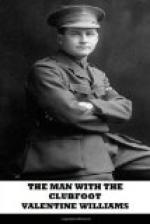“Well, if we obliged the gentleman as we obliged his brother, the gentleman might be taken where his brother was taken, the gentleman is young and smart, he might perhaps find a clue ...”
“Stop talking riddles, for Heaven’s sake!” I cried in exasperation, “and answer my questions plainly. First, what did you do for my brother?”
“Your brother had deserted from the front—that is the most difficult class of business we have to deal with—we procured him a permis de sejour for fifteen days and a post in a safe place where no enquiries would be made after him.”
“And then?” I cried, trembling with curiosity.
The Jew shrugged his shoulders, waving his hands to and fro in the air.
“Then he disappeared. I saw him a few days before he went, and he gave me the instructions I have repeated to you for anybody who should come asking for him.”
“But didn’t he tell you where he was going?”
“He didn’t even tell me he was going, Herr. He just vanished.”
“When was this?”
“Somewhere about the first week in July ... it was the week of the bad news from France.”
The message was dated July 1st, I remembered.
“I have a good set of Swedish papers,” the Jew continued, “very respectable timber merchant ... with those one could live in the best hotels and no one say a word. Or Hungarian papers, a party rejected medically ... very safe those, but perhaps the gentleman doesn’t speak Hungarian. That would be essential.”
“I am in the same case as my brother,” I said, “I must disappear.”
“Not a deserter, Herr?” The Jew cringed at the word.
“Yes,” I said. “After all, why not?”
“I daren’t do this kind of business any more, my dear sir, I really daren’t! They are making it too dangerous.”
“Come, come!” I said, “you were boasting just now that you could smooth out any difficulties. You can produce me a very satisfactory passport from somewhere, I am sure!”
“Passport! Out of the question, my dear sir! Let once one of my passports go wrong and I am ruined. Oh, no! no passports where deserters are concerned! I don’t like the business ... it’s not safe! At the beginning of the war ... ah! that was different! Oi, oi, but they ran from the Yser and from Ypres! Oi, oi, and from Verdun! But now the police are more watchful. No! It is not worth it! It would cost you too much money, besides.”
I thought the miserable cur was trying to raise the price on me, but I was mistaken. He was frightened: the business was genuinely distasteful to him.
I tried, as a final attempt to persuade him, an old trick: I showed him my money. He wavered at once, and, after many objections, protesting to the last, he left the room. He returned with a handful of filthy papers.
“I oughtn’t to do it; I know I shall rue it; but you have overpersuaded me and I liked Herr Eichenholz, a noble gentleman and free with his money—see here, the papers of a waiter, Julius Zimmermann, called up with the Landwehr but discharged medically unfit, military pay-book and permis de sejour for fifteen days. These papers are only a guarantee in case you come across the police: no questions will be asked where I shall send you.”




